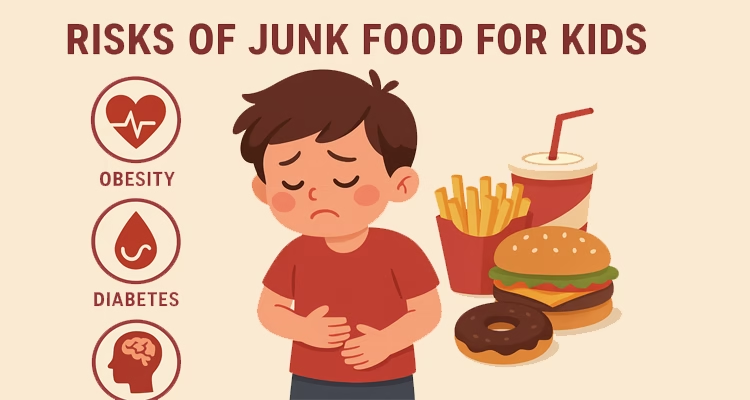
The Growing Impact of Junk Food on Children’s Health
 We all know junk food is unhealthy, yet many of us continue to consume it. But do we truly understand how harmful it is? Do we carefully check the contents of that packet of chips or Maggi noodles to verify if it contains what it claims?
We all know junk food is unhealthy, yet many of us continue to consume it. But do we truly understand how harmful it is? Do we carefully check the contents of that packet of chips or Maggi noodles to verify if it contains what it claims?
The increasing consumption of junk food among children has become a serious concern for parents, healthcare professionals, and policymakers worldwide. Junk food is typically high in calories, sugar, salt, and unhealthy fats, and its regular consumption can have severe and long-lasting effects on children’s health.
The rise of ready-to-eat food products has created opportunities for the food industry to aggressively target the large market potential within public food schemes. Today, when we think of food, items like pizza, burgers, chips, and wafers often come to mind. Children increasingly prefer these fast foods and frequently pressure their parents to buy them.
Junk food contains numerous chemicals that are harmful to our health because the body struggles to digest them. Moreover, consuming such food has often been wrongly associated with elite living. These dishes, labeled as junk food, provide little to no nutritional benefit. Many medical studies have confirmed that these foods are difficult to digest and their frequent consumption leads to various illnesses.
Chemicals in Junk Food That Harm Our Body
Regular intake of junk food can result in excessive weight gain, obesity, and related health problems such as diabetes and cardiovascular diseases. Junk food lacks essential nutrients, vitamins, and minerals, causing deficiencies and impairing children’s growth and development. The high sugar content in junk food can lead to tooth decay, cavities, and other dental problems. A diet dominated by junk food raises the risk of developing chronic diseases such as heart disease, certain types of cancer, and stroke in later life.
Excessive consumption of fatty foods leads to increased blood cholesterol levels. High fat and salt intake also raises blood pressure. In India, the problem of junk and processed food has reached alarming proportions, as even small village shops are packed with packets of potato chips, namkeen, and carbonated drinks. Junk food items like burgers, wafers, and preservative-laden salads can lead to poor concentration. Studies show that children who consume junk food frequently often lack focus.
It is essential to encourage healthy eating habits right from childhood. Fast food lacks the vital nutrients necessary for good health and is mostly made of fried and preserved ingredients, far from natural. Parents play a critical role in promoting nutritious meals, limiting junk food intake, and setting a good example. Schools and healthcare professionals must educate children about the importance of a balanced diet and the dangers of junk food. Governments can regulate junk food marketing, improve food labeling, and promote healthier options in schools and public places.
While fast food may seem like a convenient time-saver, it is often high in fat, sugar, and calories. The mantra for a healthy life should be: Eat healthy, stay away from junk food, exercise regularly, and stay fit.




